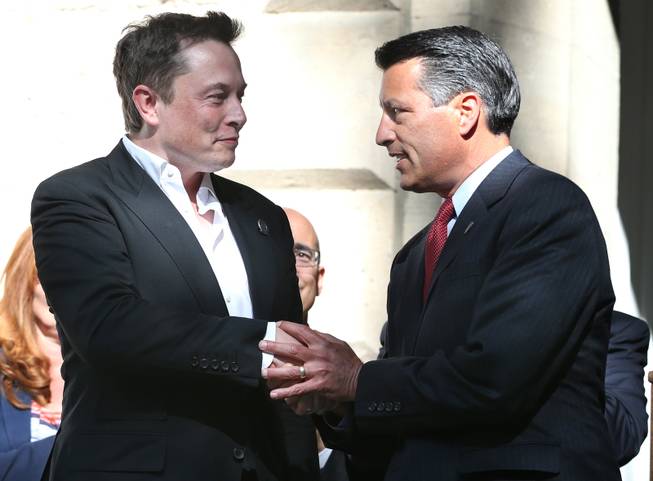
Cathleen Allison / AP
Tesla Motors CEO Elon Musk and Gov. Brian Sandoval shake hands after a press conference at the Capitol in Carson City on Thursday, Sept. 4, 2014, in which Nevada was announced as the new site for a $5 billion car battery gigafactory.
Thursday, Sept. 17, 2015 | 2 a.m.
Earlier this month, Tesla CEO Elon Musk said that the company was pursuing Nevada sources of lithium for use in its Reno battery factory. It didn’t take long for Musk’s claim to prove true, as a Nevada lithium operation announced Wednesday that it will be supplying the electric car company with an element critical in the production of its batteries.
That announcement was welcome news for critics who fretted that the state would be left behind after Tesla had signed a deal in August to obtain lithium from northern Mexico. The company received more than $1 billion in state tax incentives to construct its factory in Nevada.
State Sen. Tick Segerblom tweeted: “Musk is a man of his word!”
Under the agreement finalized on Tuesday, Tesla will purchase lithium hydroxide from Pure Energy Minerals, a company that is developing a lithium brine project a three-and-a-half hour drive from the Gigafactory. The deal is contingent on Pure Energy Minerals, based in Vancouver, British Columbia, bringing the project to completion. If it were to do so, Tesla has agreed to purchase lithium at below-market costs for five years.
“Pure Energy is aligned with both Tesla’s and the state of Nevada’s development objectives, and we hope to positively contribute to Nevada’s booming clean energy-based economy,” said Pure Energy Minerals CEO Robert Mintak. A Tesla spokesperson declined to comment.
Pure Energy Minerals’ lithium operation in Clayton Valley is in the early stages. It’s located in the same basin as Silver Peak, the only operating lithium mine in the United States. The company estimates lithium deposits there total 816,000 metric tons. The deal does not preclude Tesla from pursuing sources in addition to the two deals it has announced. The Gigafactory is expected to require 15,000 tons of lithium per year when fully operational, which is expected to occur by 2020.
Edward Anderson, the CEO of TRU Group, a company that consults on lithium projects, said he was surprised that Tesla signed the agreement. He said lithium resources from brine were limited and the chance of a successful operation in Clayton Valley slim.
“(The prospects) certainly do not excite,” Anderson said, adding that Nevada’s lithium economy had been overhyped: “There is a great danger that investors, including perhaps Tesla, are moving too quickly without proper knowledge of what they’re getting.”
Daniel Rothberg can be reached at 702-259-4285 or [email protected] Follow Daniel on Twitter at twitter.com/danielrothberg

Join the Discussion:
Check this out for a full explanation of our conversion to the LiveFyre commenting system and instructions on how to sign up for an account.
Full comments policy